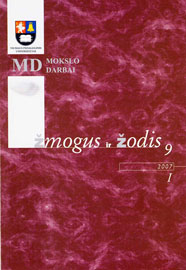Veiksminio apibūdinimo atributiniai junginiai
Action Description Attributive Phrases
Author(s): Laimutė BučienėSubject(s): Language and Literature Studies
Published by: Vytauto Didžiojo Universitetas
Keywords: action description attributive phrase; attributive meaning; subjective; objective; purpose meaning; active participle; passive participle; verbal adjective.
Summary/Abstract: The main goal of this article is to survey the significant nuances of the action description attributive phrases and to analyze, how the semantic connection between peculiarity and its possessor changes. The material of this research is taken from different texts of Lithuanian authors and from periodicals as well. Attributive components of this kind describe peculiarity of the thing, which is associated with the action. The dependent component of attributive phrases is expressed by the participle (e. g., drebančios rankos, užklydęs žmogus, suneštas turtas, smerktinas elgesys) or the verbai adjective (e. g., lenktinis peilis, tęstinis leidinys). The dominating meaning of the action description phrases is attributive, but because of the verbal features of the dependent component, supplementary subjective (e. g., besileidžianti saulė and saulė leidžiasi), objective (e. g., tiesiamas vieškelis and tiesia vieškelį), purpose (e.g., rašomasis popierius, geriamas vanduo) nuances emerge. Such relations are the result of grammatical word phrase transformation. In the derivative noun combination a deep semantic link of words remains unchanged, but the grammatical link of words, which depends on the change of word phrase, changes. Preposition is more characteristic of the dependent component of action description attributive phrases. Attribute inversion performs a function of expressiveness.
Journal: Žmogus ir žodis
- Issue Year: 09/2007
- Issue No: 1
- Page Range: 19-23
- Page Count: 5
- Language: Lithuanian

